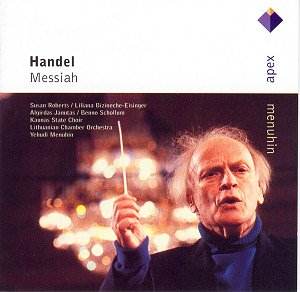As other reviewers
have noted previously, the sleeve notes
for Apex discs don’t necessarily overload
readers with information. This issue
contains a detailed track-listing in
English together with the libretto and
a very short uncredited introduction
to Messiah written in English,
French and German. Sadly however, no
details at all are given about any of
the performers, despite the fact that
the late Lord Menuhin apparently enjoyed
a sustained association with both the
orchestra and choir from 1990 until
his death in 1998. An extra page or
two containing some background explaining
this fact would have helped a lot in
terms of making sense of this recording
and its somewhat unusual collection
of artists.
From the very first
bars however, it is obvious that there
is excellent rapport between conductor
and orchestra. Menuhin takes almost
all numbers at a distinctly sprightly
pace but draws from his players crisp
and satisfying playing throughout. The
choir holds up well too, so that the
only occasion when they seem rushed
is during ‘But thanks be to God.’
Apart from some fairly heavily accented
English pronunciation, which is certainly
no worse than some attempts by UK home-teams
tackling French or German, the choral
singing is of a uniformly high standard.
The orchestra sounds to be using modern
instruments and the choir seems to be
quite a large group.
The male vocal soloists
are a problem however. Both tenor and
bass seem taxed by the virtually all
their music, with a tendency to shout
at the top of their ranges. Algirdas
Janutas (tenor) is also sorely afflicted
by an excess of inappropriate ornamentation
and Benno Schollum (who is surely more
baritone than bass) has difficulty with
both the low notes in ‘The people
that walked in darkness’ and with
the runs in both ‘Why do the nations
rage?’ and ‘The trumpet shall
sound.’ Neither is an ideal choice
for this work.
The women soloists
are very much better. Liliana Bizineche-Eisinger
does exceptionally well with all of
her arias which usefully include the
second section of ‘He was despised’
and also ‘Thou art gone up on high.’
She has an appealing mezzo–soprano voice
of which she is very much in charge.
The soprano Susan Roberts copes equally
ably and is as comfortable with the
demands of ‘Rejoice greatly’ as
she is with ‘I know that my Redeemer
liveth.’ Such is the difference
between the two men and the women however,
that I was tempted to skip all the tracks
for the male soloists on this disc at
second and third hearings.
Given that this is
a live recording, the sound is generally
very clean with only an occasional tendency
for levels to overload slightly. It
is worth having for the orchestral playing,
for the singing by the choir and women
soloists, and for the splendid playing
of trumpeter Sigitas Petrulis, because
of its bargain price.
Bill Kenny
